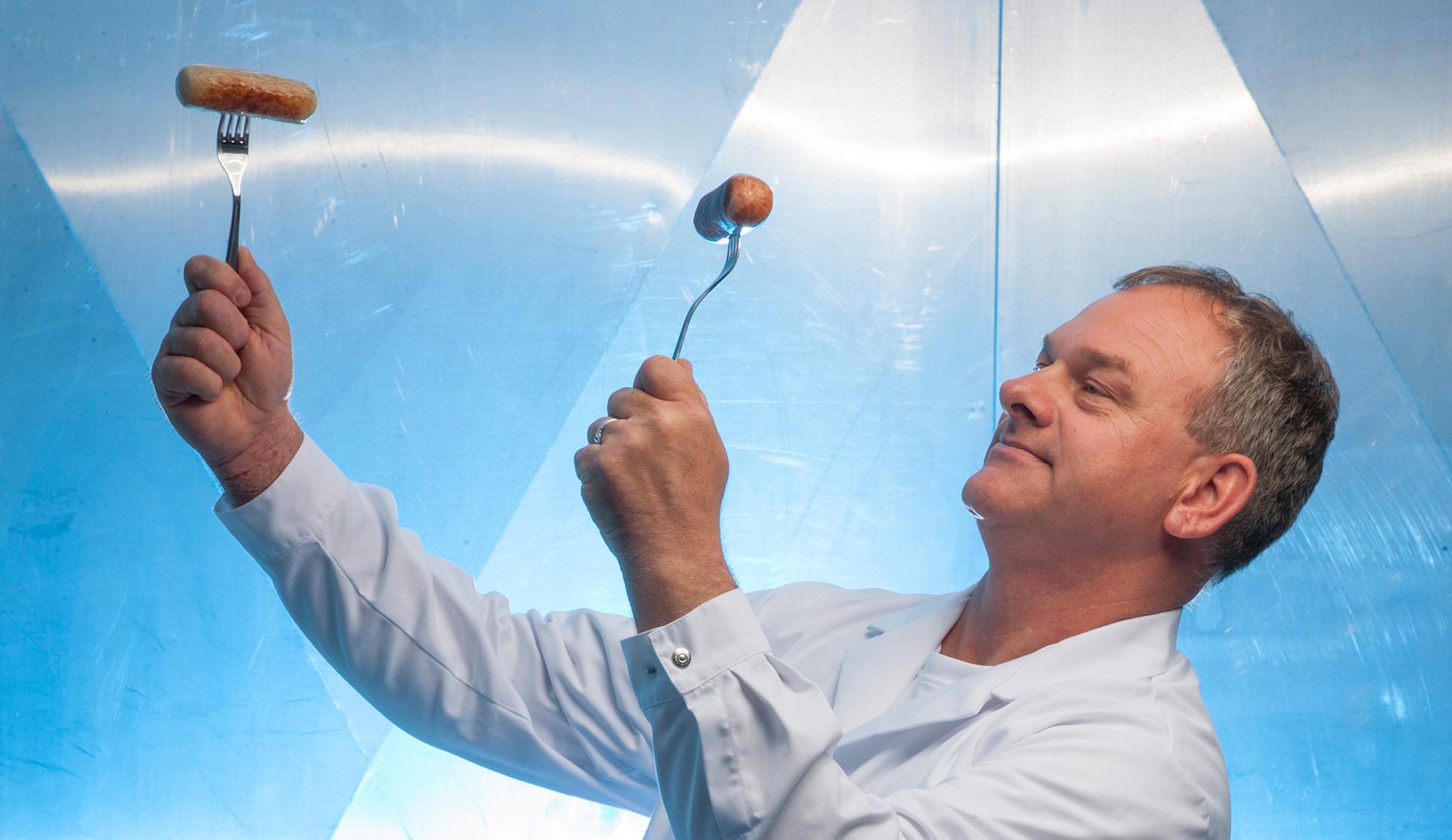
Sustainability
Responsible packaging
Migros is doing all it can to make packaging more sustainable and eco-friendly.
navigation

Sustainability
Ralph Langholz researches meat substitute products for Migros. The perfect imitation takes a lot of knowledge and experimenting, as demonstrated by the latest two developments of Migros subsidiary Micarna – a vegan bratwurst and BBQ sausage.
A long concrete ramp, a large aluminium gate and behind it: darkness. In this industrial area in Sissach near Basel, Micarna's food technologists are working on the next generation of meat substitute. In an adjoining room in the basement is the Migros subsidiary's test kitchen. Where HGVs were once assembled, is now where Ralph Langholz and his team work with table-top cutters and mixers. The 47-year-old holds the title of “Head of Alternative Protein Sources”. Ralph Langholz is looking for new products that are high in protein.
The creative kitchen in Sissach has, for example, come up with products from insect proteins from mealworms, crickets and locusts. They can be freeze-dried and eaten as a snack, or processed into a burger. “Some insects are higher in protein than meat and even nuts, pulses and cereals”, says the qualified agronomist.
The search for the perfect imitation meat has been going on for a long time. In China, the alternative has been firmly fixed on the menu for centuries. In Europe, the British food manufacturer Quorn caused an uproar 35 years ago when it launched plant-based meat made from fermented mushrooms.
Since then, the range of meat alternatives has grown rapidly. Soya schnitzel and vegetable patties are now part of a supermarket’s standard range, as are, for example, Seitan wheat protein and more and more products made of pea proteins. Pulses, whether yellow peas or chickpeas, are the new stars in the meat substitute sky.
Demand is rocketing. Turnover of vegetarian and vegan substitutes goes up around six percent every year in Switzerland. Whereas 15 years ago goods to the value of five million francs were sold, today the figure is almost four times that. Across Europe, the market potential is said to be 20 billion francs. “A growing number of people are cutting down on meat for environmental, health or animal welfare reasons”, says Langholz, explaining the trend. Not only does this include vegetarians (11 percent of the Swiss population) and vegans (3 percent of the Swiss population), but also flexitarians; one in five people in Switzerland is now a “rare meat eater”.
The growing demand is encouraging many investors and businesses to develop the best plant-based meat that tastes like animal meat. Meat processors like Micarna are on the case too. Ralph Langholz has been working for the Migros subsidiary for two years. Prior to that, he worked in food safety and promoting agricultural products, bringing together Swiss importers and farmers from all around the world. He was involved in primary products such as konjac root, which is used in vegan food.
He believes the fact that butchers are producing plant-based meat is an ideal combination: “They know the product properties of classics such as burgers and sausages and the demands of consumers – knowledge needed to perfectly imitate meat.” The agronomist says the consistency, texture and seasoning are also important in the alternatives; he himself enjoys eating meat every now and then – preferably steak. “It’s all about the amount”, is his motto. And so Micarna's new plant-based bratwurst and BBQ sausages regularly find their way onto his barbecue.
The new Micarna sausages have also been developed by butchers. Although insiders tell us they still gasp at finding vegetable meal in their mixers all of a sudden. Micarna developer Urs Kesselring, however, found the production very informative. “We created the blanks on the basis of a pea and potato protein mixture”, explains the 32-year-old.
It sounds so simple, but requires a lot of precision work. “There were countless aspects we could fine-tune”, says the meat technologist. For example, one of the major challenges is getting the consistency right. “The Swiss prefer a firmer bite compared to consumers in Germany, for example”, says Kesselring. The right bite depends on many factors: the ingredients, the mixing ratio, the volume of water and even how long and how hot the sausage is cooked.
The developers also experimented with the skin into which the sausage mixture is pressed for shaping. Natural casing used in meat sausages is, of course, not an option for vegan sausages. Micarna therefore uses a plastic blue casing which is removed after cooking.
In addition, Kesselring also gathered all the information for the product description on the packaging. “The exact composition and shelf life are details that have to be tested from scratch for every new product”, explains Kesselring. These tests took up to two months. There can be up to a year between development and sales launch.
Ralph Langholz is familiar with these lengthy processes. Food engineers are working on further developing imitation meat with alternative proteins, for example using extruders, in the test kitchen in Sissach. These are machines that process viscous or solid materials under pressure and press them out of an opening. “This gives alternative proteins a shape that resembles meat.” Plant-based chicken, for example, can be produced this way. These machines have been used in the food industry for a long time: pasta is also produced in an extruder.
The latest innovation is cultivated meat. This involves taking cells from a cow and then growing them into a piece of meat in what are known as cultivators. Migros is working in this area together with the Israeli start-up Aleph Farms. Products such as mushrooms, soya, egg white and peas are processed on an industrial scale for substitute meat. One example is Quorn, which is available at Migros as Cornatur.
The search for alternative proteins is also under way for yoghurts. Migros subsidiary ELSA is the first milk processing company to launch a plant-based yoghurt using chickpeas. This yellow pulse is a good additional option to existing yoghurt alternatives: it is high in protein and low in fat, and furthermore, the chickpeas give the yoghurt substitute a creamy texture and leave little of their own flavour. The new V-Love yoghurt alternative is set to go on sale in September 2020 in vanilla, strawberry and apricot flavours.
Discover exciting stories about all aspects of Migros, our commitment and the people behind it. We also provide practical advice for everyday life.